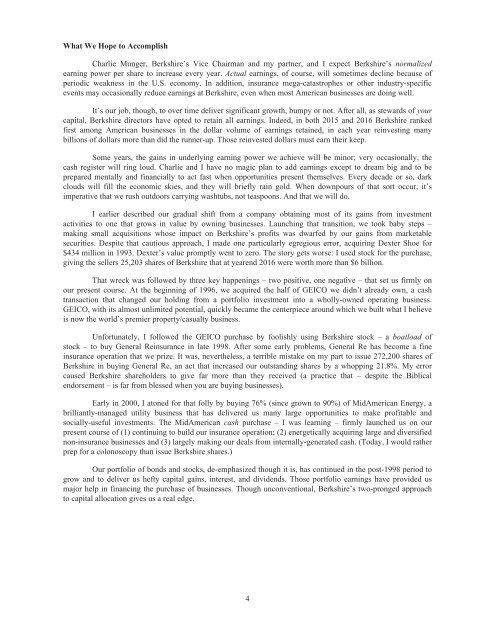Berkshire’s Performance vs the S&P 500 2
gnjtA93
gnjtA93
Create successful ePaper yourself
Turn your PDF publications into a flip-book with our unique Google optimized e-Paper software.
What We Hope to Accomplish<br />
Charlie Munger, <strong>Berkshire’s</strong> Vice Chairman and my partner, and I expect <strong>Berkshire’s</strong> normalized<br />
earning power per share to increase every year. Actual earnings, of course, will sometimes decline because of<br />
periodic weakness in <strong>the</strong> U.S. economy. In addition, insurance mega-catastrophes or o<strong>the</strong>r industry-specific<br />
events may occasionally reduce earnings at Berkshire, even when most American businesses are doing well.<br />
It’s our job, though, to over time deliver significant growth, bumpy or not. After all, as stewards of your<br />
capital, Berkshire directors have opted to retain all earnings. Indeed, in both 2015 and 2016 Berkshire ranked<br />
first among American businesses in <strong>the</strong> dollar volume of earnings retained, in each year reinvesting many<br />
billions of dollars more than did <strong>the</strong> runner-up. Those reinvested dollars must earn <strong>the</strong>ir keep.<br />
Some years, <strong>the</strong> gains in underlying earning power we achieve will be minor; very occasionally, <strong>the</strong><br />
cash register will ring loud. Charlie and I have no magic plan to add earnings except to dream big and to be<br />
prepared mentally and financially to act fast when opportunities present <strong>the</strong>mselves. Every decade or so, dark<br />
clouds will fill <strong>the</strong> economic skies, and <strong>the</strong>y will briefly rain gold. When downpours of that sort occur, it’s<br />
imperative that we rush outdoors carrying washtubs, not teaspoons. And that we will do.<br />
I earlier described our gradual shift from a company obtaining most of its gains from investment<br />
activities to one that grows in value by owning businesses. Launching that transition, we took baby steps –<br />
making small acquisitions whose impact on <strong>Berkshire’s</strong> profits was dwarfed by our gains from marketable<br />
securities. Despite that cautious approach, I made one particularly egregious error, acquiring Dexter Shoe for<br />
$434 million in 1993. Dexter’s value promptly went to zero. The story gets worse: I used stock for <strong>the</strong> purchase,<br />
giving <strong>the</strong> sellers 25,203 shares of Berkshire that at yearend 2016 were worth more than $6 billion.<br />
That wreck was followed by three key happenings – two positive, one negative – that set us firmly on<br />
our present course. At <strong>the</strong> beginning of 1996, we acquired <strong>the</strong> half of GEICO we didn’t already own, a cash<br />
transaction that changed our holding from a portfolio investment into a wholly-owned operating business.<br />
GEICO, with its almost unlimited potential, quickly became <strong>the</strong> centerpiece around which we built what I believe<br />
is now <strong>the</strong> world’s premier property/casualty business.<br />
Unfortunately, I followed <strong>the</strong> GEICO purchase by foolishly using Berkshire stock – a boatload of<br />
stock – to buy General Reinsurance in late 1998. After some early problems, General Re has become a fine<br />
insurance operation that we prize. It was, never<strong>the</strong>less, a terrible mistake on my part to issue 272,200 shares of<br />
Berkshire in buying General Re, an act that increased our outstanding shares by a whopping 21.8%. My error<br />
caused Berkshire shareholders to give far more than <strong>the</strong>y received (a practice that – despite <strong>the</strong> Biblical<br />
endorsement – is far from blessed when you are buying businesses).<br />
Early in 2000, I atoned for that folly by buying 76% (since grown to 90%) of MidAmerican Energy, a<br />
brilliantly-managed utility business that has delivered us many large opportunities to make profitable and<br />
socially-useful investments. The MidAmerican cash purchase – I was learning – firmly launched us on our<br />
present course of (1) continuing to build our insurance operation; (2) energetically acquiring large and diversified<br />
non-insurance businesses and (3) largely making our deals from internally-generated cash. (Today, I would ra<strong>the</strong>r<br />
prep for a colonoscopy than issue Berkshire shares.)<br />
Our portfolio of bonds and stocks, de-emphasized though it is, has continued in <strong>the</strong> post-1998 period to<br />
grow and to deliver us hefty capital gains, interest, and dividends. Those portfolio earnings have provided us<br />
major help in financing <strong>the</strong> purchase of businesses. Though unconventional, <strong>Berkshire’s</strong> two-pronged approach<br />
to capital allocation gives us a real edge.<br />
4


